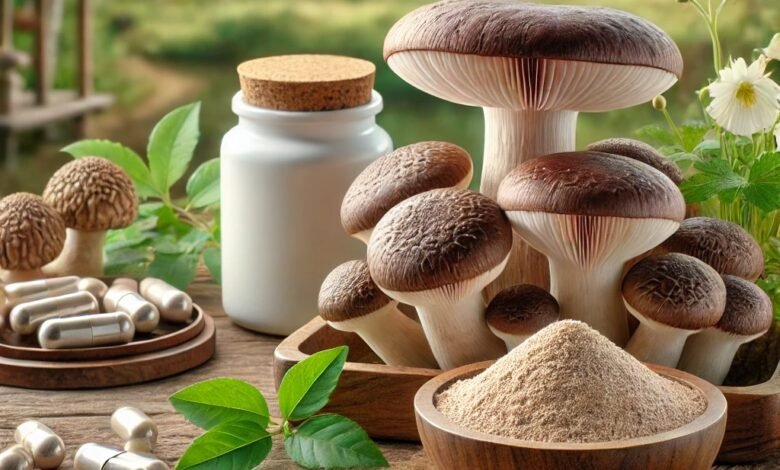The Complete Guide to Maitake Mushroom Extract: Unlocking the Power of the Dancing Mushroom for Health and Wellness

Maitake mushroom extract is gaining popularity in the world of natural health supplements due to its impressive range of potential health benefits. Known as “Grifola frondosa” in scientific terms, maitake translates to “dancing mushroom” in Japanese, a name earned from the joy experienced by those who discovered it centuries ago. Renowned for its immune-boosting, anti-cancer, and blood sugar-regulating properties, maitake mushroom extract has become a staple in the diets and wellness routines of health-conscious individuals. This guide covers everything you need to know about maitake mushroom extract, including its history, benefits, uses, dosage, and potential side effects.
What is Maitake Mushroom?
Maitake is a large, leafy mushroom native to the mountainous regions of Japan, China, and North America. It grows at the base of oak, maple, and other hardwood trees, forming clusters of grayish-brown, frond-like caps. The mushroom has a delicate, earthy flavor and has long been used in traditional Asian cuisine. However, its medicinal properties have also been recognized for centuries, particularly in traditional Chinese and Japanese medicine.
The key component of maitake mushroom extract that makes it so powerful is a compound called beta-glucan, a polysaccharide with significant immune-boosting properties. This compound helps activate various immune cells, such as macrophages and natural killer cells, which play a crucial role in the body’s defense against infections and diseases.
Key Benefits of Maitake Mushroom Extract
Maitake mushroom extract offers a wide array of health benefits due to its rich nutrient content and bioactive compounds. Here are some of the most notable benefits:
1. Boosts Immune Function
One of the most well-known benefits of maitake mushroom extract is its ability to enhance the immune system. The beta-glucans present in the mushroom stimulate immune cells, helping the body fight off infections and illness more effectively. This immune-modulating effect makes maitake mushroom extract an excellent supplement for individuals looking to improve their overall immunity or support recovery from illness.
2. Supports Cancer Prevention and Treatment
Maitake mushroom extract has been studied for its potential anti-cancer properties, particularly in breast, prostate, and liver cancers. The beta-glucans found in maitake help stimulate the activity of natural killer cells and other immune cells that can target and destroy cancer cells. Additionally, some research suggests that maitake may help reduce the side effects of chemotherapy by supporting the immune system and improving the body’s resilience.
3. Regulates Blood Sugar Levels
Maitake mushroom extract has shown promise in helping to regulate blood sugar levels, making it beneficial for people with type 2 diabetes or insulin resistance. It contains a unique compound known as “Maitake D-fraction,” which has been found to improve insulin sensitivity and lower blood glucose levels. Regular consumption of maitake extract may help manage blood sugar levels naturally, reducing the need for synthetic medications.
4. Promotes Heart Health
The polysaccharides and antioxidants in maitake mushroom extract support cardiovascular health by reducing inflammation, lowering cholesterol levels, and improving blood circulation. Some studies suggest that maitake may help prevent the formation of plaque in the arteries, thereby reducing the risk of heart attacks and strokes. Its ability to regulate blood pressure further adds to its heart-protective benefits.
5. Aids in Weight Loss
Maitake mushroom extract may support weight loss efforts due to its effects on blood sugar regulation and metabolism. By helping to stabilize blood sugar levels, maitake can reduce cravings and hunger pangs, making it easier to maintain a healthy diet. Its ability to promote fat metabolism can also aid in weight management.
6. Enhances Skin Health
The antioxidant properties of maitake mushroom extract help protect the skin from free radical damage, which can cause premature aging. Its immune-boosting effects may also help in managing skin conditions such as eczema or psoriasis by reducing inflammation and promoting healing.
How to Use Maitake Mushroom Extract
Qherb Herbal extract Maitake mushroom extract is available in various forms, including capsules, powders, tinctures, and liquid extracts. Each form has its own set of advantages, and the best choice depends on personal preferences and health goals.
1. Capsules
Capsules are the most convenient way to take maitake mushroom extract. They offer a standardized dosage and are easy to incorporate into your daily routine. This form is ideal for those who prefer not to taste the mushroom’s earthy flavor.
2. Powder
Maitake mushroom extract powder can be mixed into smoothies, juices, or even sprinkled over food. This form allows for more flexibility in dosage and can be used in culinary applications for added health benefits.
3. Tinctures and Liquid Extracts
Tinctures and liquid extracts are concentrated forms of maitake mushroom that are absorbed quickly by the body. They are often mixed with water or taken sublingually (under the tongue) for fast absorption. This form is suitable for people who need a quick-acting supplement or want to avoid swallowing pills.
4. Cooking with Fresh or Dried Maitake
While not as concentrated as extracts, fresh or dried maitake mushrooms can be used in cooking. Adding them to soups, stir-fries, or salads is a tasty way to enjoy the health benefits of maitake mushrooms while also enhancing the flavor of your meals.
Dosage Recommendations
The appropriate dosage of maitake mushroom extract depends on the form being used, the reason for use, and individual health conditions. Below are some general dosage guidelines:
- Capsules: 500–1,000 mg of maitake mushroom extract per day is a common dosage for immune support.
- Powder: 1–3 grams per day, mixed with food or drinks.
- Tincture or Liquid Extract: 1–3 ml per day, taken directly or mixed with water.
For specific conditions, such as cancer support, higher doses may be recommended. It is advisable to consult a healthcare professional for tailored dosage recommendations.
Potential Side Effects and Precautions
Maitake mushroom extract is generally considered safe for most people when used in recommended dosages. However, there are a few potential side effects and precautions to keep in mind:
- Digestive Upset: Some individuals may experience mild digestive symptoms, such as stomach upset, nausea, or diarrhea.
- Blood Sugar Interactions: Since maitake can lower blood sugar levels, individuals with diabetes or hypoglycemia should monitor their blood sugar closely and adjust their medication as needed under the guidance of a healthcare provider.
- Allergic Reactions: Although rare, some people may be allergic to mushrooms. Discontinue use if you experience symptoms like rash, itching, or difficulty breathing.
- Pregnancy and Breastfeeding: The safety of maitake mushroom extract during pregnancy and breastfeeding has not been well-studied. It is best to avoid using the extract during these times unless under the supervision of a healthcare provider.
Comparing Maitake with Other Medicinal Mushrooms
Maitake mushroom is just one of many medicinal mushrooms known for their health benefits. Here’s how it compares to some of the other popular medicinal mushrooms:
- Reishi: Known as the “mushroom of immortality,” reishi is often used for its calming effects and ability to reduce stress. While maitake is more associated with immune modulation and blood sugar regulation, reishi focuses on enhancing longevity and relaxation.
- Chaga: Chaga mushroom is packed with antioxidants and is commonly used for its anti-inflammatory and anti-cancer properties. Maitake may be a better choice if the goal is to improve immune function specifically.
- Cordyceps: This mushroom is famed for its energy-boosting and athletic performance-enhancing effects. While cordyceps is often used by athletes, maitake is more suitable for individuals looking to support immune function and regulate blood sugar.
- Lion’s Mane: Lion’s mane mushroom is primarily used for cognitive support and neuroprotection. If improving brain health is a priority, lion’s mane may be more appropriate, whereas maitake is beneficial for immune support and blood sugar management.
Conclusion
Maitake mushroom extract is a versatile and potent natural supplement with numerous potential health benefits, ranging from immune support and cancer prevention to blood sugar regulation and heart health. Its long history in traditional medicine and growing body of scientific research make it a popular choice for those seeking natural solutions for various health concerns.
As with any supplement, it is important to choose high-quality products and adhere to dosage guidelines. Consulting a healthcare provider is especially important if you have underlying health conditions or are taking other medications.
Whether you’re looking to boost your immune system, support weight loss, or maintain overall wellness, maitake mushroom extract can be a valuable addition to your health routine. Unlock the power of the “dancing mushroom” and explore the many ways it can enhance your quality of life.




